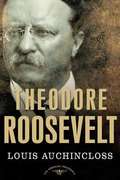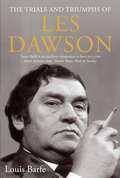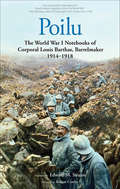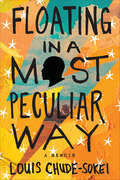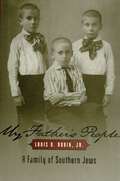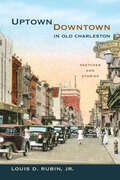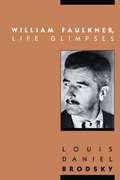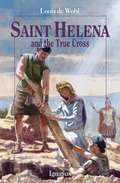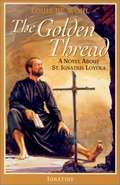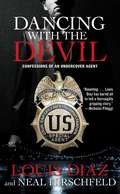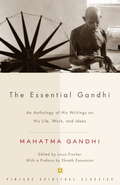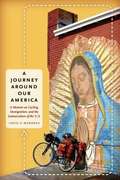- Table View
- List View
Theodore Roosevelt
by Louis AuchinclossIn depth biography of the first American President of the twentieth century.
Woodrow Wilson
by Louis AuchinclossWoodrow Wilson sheds new light on Wilson's upbringing and career, from the grim determination that enabled him to overcome dyslexia to the skillful dance of isolationism and intervention in World War I to the intransigence that--despite his most cherished vision--caused the Senate's rejection of the League of Nations. Here, from the dynamic figure whose ringing speeches hypnotized vast crowds to the gentle voice reading poetry aloud and the comic star of family skits and charades to the rising academic and president of Princeton who made the giant leap into politics are all the triumphs and final tragic irony of this flawed apostle of world peace. Our twenty-eighth president was, says Louis Auchincloss, "the greatest idealist who ever occupied the White House." And who better than Auchincloss, with his penchant for quirky personalities and fascination with fin-de-sicle society, to explore this complex persona?
The Trials and Triumphs of Les Dawson
by Louis BarfeThe first ever narrative biography of a towering figure in British comedy Les Dawson, more than any other comedian, spoke for the phlegmatic, pessimistic British way of life. A Northern lad who climbed out of the slums thanks to an uncommonly brilliant mind, he was always the underdog, but his bark was funnier and more incisive than many comics who claimed to bite. Married twice in real life, he had a third wife in his comic world—a fictional ogre built from spare parts left by fleeing Nazis at the end of World War II—and an equally frightening mother-in-law. He was down to earth, yet given to eloquent, absurd flights of fancy. He was endlessly generous with his time, but slow to buy a round of drinks. He was a mass of contradictions. In short, he was human, he was genuine, and that's why audiences loved him. This is his story.
Poilu: The World War I Notebooks of Corporal Louis Barthas, Barrelmaker, 1914 – 1918
by Louis Barthas&“An exceptionally vivid memoir of a French soldier&’s experience of the First World War.&”—Max Hastings, New York Times bestselling author Along with millions of other Frenchmen, Louis Barthas, a thirty-five-year-old barrelmaker from a small wine-growing town, was conscripted to fight the Germans in the opening days of World War I. Corporal Barthas spent the next four years in near-ceaseless combat, wherever the French army fought its fiercest battles: Artois, Flanders, Champagne, Verdun, the Somme, the Argonne. First published in France in 1978, this excellent new translation brings Barthas&’ wartime writings to English-language readers for the first time. His notebooks and letters represent the quintessential memoir of a &“poilu,&” or &“hairy one,&” as the untidy, unshaven French infantryman of the fighting trenches was familiarly known. Upon Barthas&’ return home in 1919, he painstakingly transcribed his day-to-day writings into nineteen notebooks, preserving not only his own story but also the larger story of the unnumbered soldiers who never returned. Recounting bloody battles and endless exhaustion, the deaths of comrades, the infuriating incompetence and tyranny of his own officers, Barthas also describes spontaneous acts of camaraderie between French poilus and their German foes in trenches just a few paces apart. An eloquent witness and keen observer, Barthas takes his readers directly into the heart of the Great War. &“This is clearly one of the most readable and indispensable accounts of the death of the glory of war.&”—The Daily Beast (&“Hot Reads&”)
Floating In A Most Peculiar Way: A Memoir
by Louis Chude-SokeiThe astonishing journey of a bright, utterly displaced boy, from the short-lived African nation of Biafra, to Jamaica, to the harshest streets of Los Angeles—a searing memoir that adds fascinating depth to the coming-to-America storyThe first time Chude-Sokei realizes that he is &“first son of the first son&” of a renowned leader of the bygone African nation is in Uncle Daddy and Big Auntie&’s strict religious household in Jamaica, where he lives with other abandoned children. A visiting African has just fallen to his knees to shake him by the shoulders: &“Is this the boy? Is this him?&”Chude-Sokei&’s immersion in the politics of race and belonging across the landscape of the African diaspora takes a turn when his traumatized mother, who has her own extraordinary history as the onetime &“Jackie O of Biafra,&” finally sends for him to come live with her. In Inglewood, Los Angeles, on the eve of gangsta rap and the LA riots, it&’s as if he&’s fallen to Earth. In this world, anything alien—definitely Chude-Sokei&’s secret obsession with science fiction and David Bowie—is a danger, and his yearning to become a Black American gets deeply, sometimes absurdly, complicated. Ultimately, it is a boisterous pan-African family of honorary aunts, uncles, and cousins that becomes his secret society, teaching him the redemptive skill of navigating not just Blackness, but Blacknesses, in his America.
Recollections of the Private Life of Napoleon -- Volume 01
by Louis Constant WairypubOne. info present you this new edition. Though this work was first published in 1830, it has never before been translated into English. Indeed, the volumes are almost out of print. When in Paris a few years ago the writer secured, with much difficulty, a copy, from which this translation has been made. Notes have been added by the translator, and illustrations by the publishers, which, it is believed, will enhance the interest of the original work by Constant.
Recollections of the Private Life of Napoleon -- Volume 02
by Louis Constant WairypubOne. info present you this new edition. In the month of May, 1801, there came to Paris, on his way to take possession of his new kingdom, the Prince of Tuscany, Don Louis the First, whom the First Consul had just made King of Etruria. He traveled under the name of the Count of Leghorn, with his wife, who was the infanta of Spain, Maria Louisa, third daughter of Charles the Fourth; but in spite of the incognito, which, from the modest title he had assumed, he seemed really anxious to preserve, especially, perhaps, on account of the poor appearance of his small court, he was, notwithstanding, received and treated at the Tuileries as a king. This prince was in feeble health, and it was said had epilepsy. They were lodged at the residence of the Spanish Embassy, formerly the Hotel Montessori; and he requested Madame de Montessori, who lived in the next house, to reopen a private communication between the houses which had long been closed. He, as well as the Queen of Etruria, greatly enjoyed the society of this lady, who was the widow of the Duke of Orleans, and spent many hours every day in her house.
Recollections of the Private Life of Napoleon -- Volume 03
by Louis Constant WairypubOne. info present you this new edition. The First Consul left Boulogne to return to Paris, in order to be present at the marriage of one of his sisters. Prince Camille Borghese, descendant of the noblest family of Rome, had already arrived at Paris to- marry Madame Pauline Bonaparte, widow of General Leclerc, who had died of yellow fever in San Domingo. I recollect having seen this unfortunate general at the residence of the First Consul some time before his departure on the ill-starred expedition which cost him his life, and France the loss of many brave soldiers and much treasure. General Leclerc, whose name is now almost forgotten, or held in light esteem, was a kind and good man. He was passionately in love with his wife, whose giddiness, to put it mildly, afflicted him sorely, and threw him into a deep and habitual melancholy painful to witness. Princess Pauline (who was then far from being a princess) had married him willingly, and of her own choice; but this did not prevent her tormenting her husband by her innumerable caprices, and repeating to him a hundred times a day that he was indeed a fortunate man to marry the sister of the First Consul.
Recollections of the Private Life of Napoleon -- Volume 04
by Louis Constant WairypubOne. info present you this new edition. It was the 2d of January, 1805, exactly a month after the coronation, that I formed with the eldest daughter of M. Charvet a union which has been, and will I trust ever be, the greatest happiness of my life. I promised the reader to say very little of myself; and, in fact, how could he be interested in any details of my own private life which did not throw additional light upon the character of the great man about whom I have undertaken to write? Nevertheless, I will ask permission to return for a little while to this, the most interesting of all periods to me, and which exerted such an influence upon my whole life. Surely he who recalls and relates his souvenirs is not forbidden to attach some importance to those which most nearly concern himself. Moreover, even in the most personal events of my life, there were instances in which their Majesties took a part, and which, from that fact, are of importance in enabling the reader to form a correct estimate of the characters of both the Emperor and the Empress.
Recollections of the Private Life of Napoleon -- Volume 05
by Louis Constant WairypubOne. info present you this new edition. I left the Emperor at Berlin, where each day, and each hour of the day, he received news of some victory gained, or some success obtained by his generals. General Beaumont presented to him eighty flags captured from the enemy by his division, and Colonel Gerard also presented sixty taken from Blucher at the battle of Wismar. Madgeburg had capitulated, and a garrison of sixty thousand men had marched out under the eyes of General Savary. Marshal Mortier occupied Hanover in the name of France, and Prince Murat was on the point of entering Warsaw after driving out the Russians.
Recollections of the Private Life of Napoleon -- Volume 06
by Louis Constant WairypubOne. info present you this new edition. We arrived in Paris on the 1st of January at nine o'clock in the evening; and as the theater of the palace of the Tuileries was now completed, on the Sunday following his Majesty's return the Griselda of M. Paer was presented in this magnificent hall. Their Majesties' boxes were situated in front of the curtain, opposite each other, and presented a charming picture, with their hangings of crimson silk draped above, and forming a background to broad, movable mirrors, which reflected at will the audience or the play. The Emperor, still impressed with the recollections of the theaters of Italy, criticised unsparingly that of the Tuileries, saying that it was inconvenient, badly planned, and much too large for a palace theater; but notwithstanding all these criticisms, when the day of inauguration came, and the Emperor was convinced of the very great ingenuity M. Fontaine had shown in distributing the boxes so as to make the splendid toilets appear to the utmost advantage, he appeared well satisfied, and charged the Duke of Frioul to present to M.
Recollections of the Private Life of Napoleon -- Volume 07
by Louis Constant WairypubOne. info present you this new edition. His Majesty remained only ten days at Saint-Cloud, passed two or three of these in Paris at the opening of the session of the Corps Legislatif, and at noon on the 29th set out a second time for Bayonne.
Recollections of the Private Life of Napoleon -- Volume 08
by Louis Constant WairypubOne. info present you this new edition. Towards the end of September the Emperor made a journey to Raab; and, as he was mounting his horse to return to his residence at Schoenbrunn, he saw the bishop a few steps from him. "Is not that the bishop? " said he to M. Jardin, who was holding his horse's head. "No, Sire, it is Soliman. "- "I asked you if that was not the bishop, " repeated his Majesty, pointing to the prelate. M. Jardin, intent on business, and thinking only of the Emperor's horse which bore the name of Bishop, again replied, "Sire, you forget that you rode him on the last relay. " The Emperor now perceived the mistake, and broke into a laugh. I was witness at Wagram of an act which furnished a fine illustration of the Emperor's kindness of heart and consideration for others, of which I have already given several instances; for, although in the one I shall now relate, he was forced to refuse an act of clemency, his very refusal challenges admiration as an exhibition of the generosity and greatness of his soul.
Recollections of the Private Life of Napoleon -- Volume 09
by Louis Constant WairypubOne. info present you this new edition. In September, 1811, the Emperor decided to make a journey into Flanders in company with the Empress, that he might personally ascertain if his orders had been carried out in all matters concerning both the civil and religious administration. Their Majesties left Compiegne on the 19th, and arrived at Montreuil-sur-Mer at nine o'clock in the evening. I accompanied the Emperor on this journey. I have read in O'Meara's Memorial that M. Marchand was at that time in the service of Napoleon. This is incorrect; for M. Marchand did not enter the Emperor's private service until 1814, at Fontainebleau. His Majesty at that time ordered me to select from the domestics of the service an intelligent young man to assist me in my duties near his person, since none of the ordinary 'valets de chambre' were to remain on the island of Elba. I mentioned the name of M. Marchand, son of a nurse of the King of Rome, as a suitable person for the place. He was accepted by his Majesty, and from that time M. Marchand formed a part of the private service of the Emperor.
Recollections of the Private Life of Napoleon -- Volume 10
by Louis Constant WairypubOne. info present you this new edition. During the whole Russian campaign, the Emperor was nearly always badly lodged. It was necessary, however, to accommodate himself to circumstances; though this was a somewhat difficult task to those who were accustomed to lodge in palaces. The Emperor accepted the situation bravely, and all his followers consequently did the same. In consequence of the system of incendiarism adopted as the policy of Russia, the wealthy part of the population withdrew into the country, abandoning to the enemy their houses already ruined. In truth, on the whole road leading to Moscow, with the exception of a few unimportant towns, the dwellings were very wretched; and after long and fatiguing marches, we were very happy if we found even a hut at the place the Emperor indicated as headquarters. The owners of these miserable hovels on quitting them left there sometimes two or three seats and wooden beds, in which were an abundant supply of vermin that no invasion could drive out. The least filthy place was chosen, which was usually the most airy; and we knew when the cold came, icy breezes would not fail us.
Recollections of the Private Life of Napoleon -- Volume 11
by Louis Constant WairypubOne. info present you this new edition. During the second day of the battle of Dresden, at the end of which the Emperor had the attack of fever I mentioned in the preceding chapter, the King of Naples, or rather Marshal Murat, performed prodigies of valor. Much has been said of this truly extraordinary prince; but only those who saw him personally could form a correct idea of him, and even they never knew him perfectly until they had seen him on a field of battle. There he seemed like those great actors who produce a complete illusion amid the fascinations of the stage, but in whom we no longer find the hero when we encounter them in private life. While at Paris I attended a representation of the death of 'Hector' by Luce de Lancival, and I could never afterwards hear the verses recited in which the author describes the effect produced on the Trojan army by the appearance of Achilles without thinking of Prince Murat; and it may be said without exaggeration that his presence produced exactly this effect the moment he showed himself in front of the Austrian lines.
Recollections of the Private Life of Napoleon -- Volume 12
by Louis Constant WairypubOne. info present you this new edition. After the brilliant successes obtained by the Emperor in such a short time, and with forces so exceedingly inferior to the great masses of the enemy, his Majesty, realizing the necessity of allowing his troops to take a rest of some days at Troyes, entered into negotiations for an armistice with the Prince von Schwarzenberg.
My Father's People: A Family of Southern Jews
by Louis D. Jr.Louis Rubin's people on his father's side were odd, inscrutable, and remarkable. In contrast to his mother's family, who were "normal, good people devoid of mystery," the ways of the Rubins both puzzled and attracted him. In My Father's People, Rubin tells "as best I can about them all -- my father, his three brothers, and his three sisters." It is a searching, sensitive story of Americanization, assimilation, and the displacement -- and survival -- of a religious heritage.Born between 1888 and 1902 in Charleston, South Carolina, their father an immigrant Russian Jew, the Rubin children suffered dire poverty, humiliation, and separation when their parents became incapacitated. Three of the boys were sent to the Hebrew Orphans' Home in Atlanta for several years. Yet the sons all managed to build long, productive, even notable lives and livelihoods, becoming, variously, a newspaper editor, Broadway playwright and Hollywood screenwriter, businessman, and -- in the case of Rubin's father -- a far-famed long-range weather prognosticator.Private people, reticent to discuss their painful early years, the Rubins were not easily knowable. Still, the author draws a strikingly candid portrait of each, using memories, stories, keen insight, and broad empathy -- fascinating character studies full of individual propensities and peculiarities that together reveal the wider family resemblance. Although the Rubins were mostly nonreligious as adults, their family's rabbinical tradition and their experience as southern Jews were key to their vocational fervor and the lives they made for themselves. "They were Americans, and they were Jews," Rubin concludes. "These were enough."Told with Louis Rubin's signature eloquence and wit, My Father's People is a testimony to the courage of immigrant southern Jews and their gifts to their chosen country.
Uptown/Downtown in Old Charleston: Sketches and Stories
by Louis D. Rubin Jr.A series of semi-autobiographical sketches and stories detailing life in Charleston, South Carolina, in the 1930s and ‘40s.Growing up in Charleston in the 1930s and 1940s, accomplished storyteller Louis Rubin witnessed the subtle gradations of caste and class among neighborhoods, from south of Broad Street where established families and traditional mores held sway, to the various enclaves of Uptown, in which middle-class and blue-collar families went about their own diverse lives and routines. In Uptown/Downtown in Old Charleston, Rubin draws on autobiography and imagination in briskly paced renderings of his native Charleston that capture the atmosphere of the Holy City during an era when the population had not yet swelled above sixty-five thousand. Rubin’s wide-eyed narrator takes readers on excursions to Adger’s Wharf, the Battery, Union Terminal, the shops of King Street, the Majestic Theater, the College of Charleston, and other recognizable landmarks. With youthful glee he watches the barges and shrimp trawlers along the waterfront, rides streetcars down Rutledge Avenue and trains to Savannah and Richmond, paddles the Ashley River in a leaky homemade boat, pitches left-handed for the youngest team in the Twilight Baseball League, ponders the curious chanting coming from the Jewish Community Center, and catches magical glimpses of the Morris Island lighthouse from atop the Folly Beach Ferris wheel. His fascination with the gas-electric Boll Weevil train epitomizes his appreciation for the freedom of movement between the worlds of Uptown and Downtown that defines his youth in Charleston.This collection ends with a homecoming to Charleston by our narrator, then a young man in his early twenties, as his inbound train is greeted by familiar vistas of the city as well as by views he had never encountered before. This is the city Rubin called home, where there were always surprising discoveries to be found both in the burgeoning newness of Uptown and the storied legacies of Downtown.“Uptown/Downtown in Old Charleston is about a city in some ways larger that the state in which it resides. The book is also about memory and boyhood and baseball and boats and trains and family—and it packs a great wallop because it’s written by one of the country’s finest writers. These nine stories are among the best nine innings of history you’ll ever read.” —Clyde Edgerton“Louis Rubin brings the city to life with his insider guide to a secret Charleston too often overlooked in the carriage tours and guidebooks of today. Rubin allows you to enter the soul of the real Charleston, revealing its essence and depth. A wonderful, necessary book.” —Pat Conroy, author of South of Broad
William Faulkner, Life Glimpses
by Louis Daniel BrodskyDuring thirty years of literary collecting, Louis Daniel Brodsky has acquired some of the most important source materials on the life and work of William Faulkner anywhere available. Indeed, the Brodsky Collection, now owned by Southeast Missouri State University, has been characterized by Robert Penn Warren as "stupendous. " In William Faulkner, Life Glimpses, Brodsky mines this storehouse of previously unpublished material, using interviews, letters, speeches, movie scripts, and notes to enrich our understanding of this well-known Southern writer. The result is a highly readable biography that is thematic and episodic rather than chronological in its organization. Building on specific documents in the collection, Brodsky opens new windows on the parallel development of Faulkner's literary career and personal life. New material on the early poems ''Elder Watson in Heaven" and "Pregnancy" gives insight into Faulkner's developing literary and personal aesthetics during the 1920s and 1930s. Faulkner's metamorphosis from self-doubting, isolated artist to confident public spokesman during the 1940s and 1950s forms the central core of the study. Through previously unavailable screenplays written for Warner Bros. during World War II and an interview with Faulkner's fellow screenwriter Albert I. "Buzz" Bezzerides, Brodsky charts the decline in Faulkner's literary output and his corresponding discovery of a public voice. He shows how Faulkner's astonishingly positive 1950 Nobel Prize acceptance speech was not a sudden about-face from the bleak outlook that had produced The Sound and the Fury. Rather, Faulkner's years in Hollywood showed him that words, even screenplays, could shape the way people think and react. Faulkner's lifelong quest for a "manly" role ended, Brodsky declares, when he took up the mantle of public spokesmanship. In the final chapter, a revealing interview with Faulkner's granddaughter, Victoria Fielden Johnson, paints an insider's portrait of life at the Faulkner home, Rowan Oak. A copy of Faulkner's recipe for curing pork, included in the appendix, emphasizes his longterm struggle to produce fine literature while supplying the everyday needs of a large family. These and other materials, previously unavailable to scholars and the reading public, will broaden and enrich our understanding of one of America's most celebrated writers.
Saint Helena and the True Cross
by Louis De WohlSet against the colorful background of power struggles in imperial Rome and battling Roman legions, this is the exciting story of St. Helena, mother of the Emperor Constantine, who found the Cross of Christ in Jerusalem. This book for young people paints a vivid portrait of a remarkable woman who overcame every obstacle with faith, hope, perseverance... and a healthy dose of ambition. In this 29th book in the acclaimed Vision Books series for youth 9 to 15 years old, Louis de Wohl, known for his masterful storytelling, describes the amazing events that led to the conversion of Helena and the rise to power of her son. He also recounts the vision Constantine experienced on the eve of a pivotal battle and his subsequent legalization of Christianity in the fourth century. The story dramatically concludes withSt. Helena's final accomplishment — her dangerous and miraculous expedition to the Holy Land.
The Golden Thread: A Novel about St. Ignatius Loyola
by Louis De WohlLouis de Wohl, with humility and deep religious conviction, takes us into the mind and heart of a saint, giving at the same time an enthralling picture of the era in which he lived.
Dancing with the Devil: The True Story of an Undercover Agent's War on Crime
by Louis Diaz Neal HirschfeldIN AMERICAN GANGSTER, THE FEDS TOOK DOWN INFAMOUS HEROIN DEALER FRANK LUCAS. BUT THE KINGPIN BEHIND LUCAS'S CRIMINAL REIGN, LEROY "NICKY" BARNES, REMAINED "MR. UNTOUCHABLE." UNTIL ONE UNDERCOVER AGENT PROVED TOUGH ENOUGH--OR CRAZY ENOUGH--TO INFILTRATE HIS DOMAIN AND NAIL THE MOST DANGEROUS DRUG CZAR IN AMERICAN HISTORY. Growing up in Red Hook, Brooklyn, where physical violence was a daily reality at home, at school, and on the streets, Louis Diaz had what it took to survive--and to one day become what he vowed to be: a man of uncompromising principles who is "compassionate on the inside, fierce on the outside." These were the qualities, along with his street fighter's steely nerves and hair-trigger temper, that drove Diaz from his savage beginnings and early forays in organized crime to become one of the DEA's bravest undercover agents--the man who was instrumental in taking down some of the nation's and the world's most notorious crime rings. In an unforgettable and utterly engaging first-person narrative, Diaz tells his gritty, colorful, painful, and even humorous life story--a story with all the raw emotional power and bare-knuckle action of Wiseguy or Serpico. From his headline-making cases of Nicky Barnes and the Medellín cartel . . . to his account of outwitting a key villain linked to the record-breaking heist known as The Great English Train Robbery . . . to his all-out confrontations with murderous gunrunners and drug dealers on the mean streets of New York . . . to leading commando raids on clan-destine cocaine labs inside the Bolivian jungles, Dancing with the Devil is an explosive memoir that stands as a classic of true-crime literature.
The Essential Gandhi: An Anthology of His Writings on His Life, Work, and Ideas
by Mahatma Gandhi Louis FischerMohandas K. Gandhi, called Mahatma ("great soul"), was the father of modern India, but his influence has spread well beyond the subcontinent and is as important today as it was in the first part of the twentieth century and during this nation's own civil rights movement. Taken from Gandhi's writings throughout his life, The Essential Gandhi introduces us to his thoughts on politics, spirituality, poverty, suffering, love, non-violence, civil disobedience, and his own life. The pieces collected here, with explanatory head notes by Gandhi biographer Louis Fischer, offer the clearest, most thorough portrait of one of the greatest spiritual leaders the world has known."Gandhi was inevitable. If humanity is to progress, Gandhi is inescapable. . . . We may ignore him at our own risk." -Dr. Martin Luther King, Jr.With a new Preface drawn from the writings of Eknath EaswaranIn the annals of spirituality certain books stand out both for their historical importance and for their continued relevance. The Vintage Spiritual Classics series offers the greatest of these works in authoritative new editions, with specially commissioned essays by noted contemporary commentators. Filled with eloquence and fresh insight, encouragement and solace, Vintage Spiritual Classics are incomparable resources for all readers who seek a more substantive understanding of mankind's relation to the divine.
A Journey Around Our America: A Memoir on Cycling, Immigration, and the Latinoization of the U.S.
by Louis G. MendozaImmigration and the growing Latino population of the United States have become such contentious issues that it can be hard to have a civil conversation about how Latinoization is changing the face of America. So in the summer of 2007, Louis Mendoza set out to do just that. Starting from Santa Cruz, California, he bicycled 8,500 miles around the entire perimeter of the country, talking to people in large cities and small towns about their experiences either as immigrants or as residents who have welcomed - or not - Latino immigrants into their communities. He presented their enlightening, sometimes surprising, firsthand accounts in Conversations Across Our America: Talking About Immigration and the Latinoization of the United States. Now, in A Journey Around Our America, Mendoza offers his own account of the visceral, emotional, intellectual, and spiritual dimensions of traveling the country in search of a deeper, broader understanding of what it means to be Latino in the United States in the twenty-first century. With a blend of first- and second-person narratives, blog entries, poetry, and excerpts from conversations he had along the way, Mendoza presents his own aspirations for and critique of social relations, political ruminations, personal experiences, and emotional vulnerability alongside the stories of people from all walks of life, including students, activists, manual laborers, and intellectuals. His conversations and his experiences as a Latino on the road reveal the multilayered complexity of Latino life today as no academic study or newspaper report ever could.
